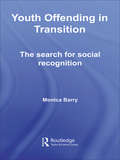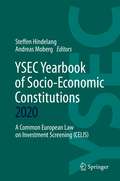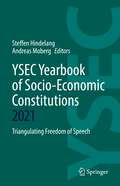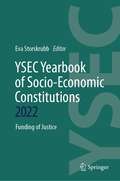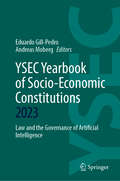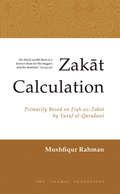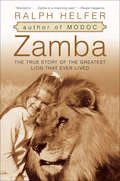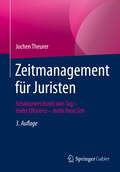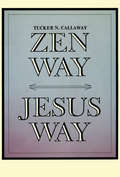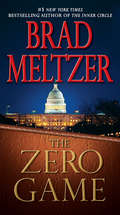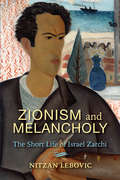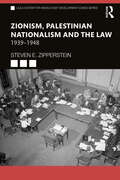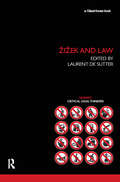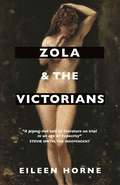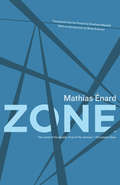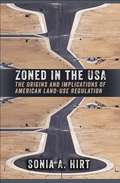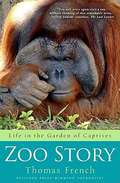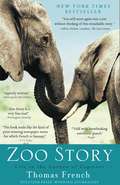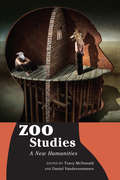- Table View
- List View
Youth Offending in Transition: The Search for Social Recognition
by Monica BarryTaking a new approach to youth crime, this book argues that the transition from childhood to adulthood can be an isolating and disempowering experience for young people. Children and young people are inherently vulnerable because of their age and status – they are a minority group, with the potential for being exploited, discriminated against, dominated and disrespected by adults. Youth Offending in Transition explores how their treatment by adult society may lead young people to resort to crime as a means of gaining respect from their peers. Using concepts of capital and the narratives of young offenders themselves, this book is based on original research into the reasons why young people start and stop offending. It discusses the following topics: criminal theory and the significance of youth transitions to the ‘age-crime curve’ social identity and reputation amongst young people social inequalities and their influence on youth transitions the criminalization and discrimination of young people by adults the importance of social recognition in reducing offending.
YSEC Yearbook of Socio-Economic Constitutions 2020: A Common European Law on Investment Screening (CELIS) (YSEC Yearbook of Socio-Economic Constitutions #2020)
by Steffen Hindelang Andreas MobergThis book presents the very first, interdisciplinarily grounded, comprehensive appraisal of a future “Common European Law on Investment Screening”. Thereby, it provides a foundation for a European administrative law framework for investment screening by setting out viable solutions and evaluating their pros and cons. Daimler, the harbour terminal in Zeebrugge, or Saxo Bank are only three recent examples of controversially discussed company takeovers in Europe. The “elephant in the room” is China and its “Belt and Road Initiative”. The political will in Europe is growing to more actively control investments flowing into the EU. The current regulatory initiatives raise several fundamental, constitutional and regulatory issues. Surprisingly, they have not been addressed in any depth so far. The book takes stock of the current rather fragmented regulatory approaches and combines contributions from leading international academics, practitioners, and policy makers in their respective fields. Due to the volume’s comprehensive approach, it is expected to influence the broader debate on the EU’s upcoming regulation of this matter. The book is addressed to participants from academia as well as to representatives from government, business, and civil society.
YSEC Yearbook of Socio-Economic Constitutions 2021: Triangulating Freedom of Speech (YSEC Yearbook of Socio-Economic Constitutions #2021)
by Steffen Hindelang Andreas MobergThis volume addresses contemporary challenges, enabled by modern technology, that concern upholding freedom of speech where it conflicts with social rights, such as respect for private and family life, and with economic rights, such as the freedom to conduct business or the right to free movement. In today’s networked world, technological shifts happen faster than most people even realize. Some of these shifts have made us all potentially powerful: media powerful. We used to sit in silence in front of newspapers and TV screens, and the world was explained to us by just a few sources. Today, thanks to the Internet, social media, and Web 2.0, we can not only share our own thoughts with everyone in a more self-determined way, but we can also take part in public debate and even co-shape it ourselves. Of course, the Internet is not a counter-design to the communication (power) structures of the past. Gains in communicative self-determination are threatened due to algorithmisation, platformisation, and value extraction from self-created private markets. At the same time, the empowerment of the individual challenges the old “grand speakers” who are suddenly detecting “fake news”, echo chambers, and filter bubbles everywhere on the Internet. Internet-based communication allegedly hinders us from the “one truth”; as if newspaper hoaxes, propaganda, and narrow-mindedness were an invention of the Internet. The current heated debate over “fake news”, copyright, and “upload filters” shows that we are unsure of how to deal with the newer and more complex phenomena of Internet-based speech. This is due in no small part to the fact that an important benchmark – our constitutional compass – is still firmly rooted in the past. Constitutions change far more slowly than technologies. Societal changes can drive constitutional changes; but what about normative content control? Today, there are already demands for “old-school clarity”: truth filters on social media platforms, horrendous sums of liability for platforms that encourage (overly)thorough cleaning up. However, it is equally true that private individuals “regulate”: they decide what is found on the Internet and who may post on a given platform. Accounting for all interests at play and striking a “fair” balance that avoids both a public and private over- and under-regulation is a complex matter. The authors of this volume not only provide reflections in their highly topical contributions, but also share their understanding of what constitutes a fair balance within the larger frame of freedom of speech in a digital age.
YSEC Yearbook of Socio-Economic Constitutions 2022: Funding of Justice (YSEC Yearbook of Socio-Economic Constitutions #2022)
by Eva StorskrubbFunding of justice has significant consequences for the enforcement of rights and impacts directly on access to justice and the right to a fair trial as constitutional rights. Access to justice in turn essentially impacts on the effective enjoyment of any other constitutional right, since having the actual means to access a court in case of a potential breach strengthens that right. Public funding, such as legal aid, has come under pressure due to the reality of financial austerity measures and the tightening public budgets in many countries. This has contributed to privatization and marketisation of funding in ever more jurisdictions. Private forms of funding include inter alia litigation insurance, third-party litigation finance and crowdfunding, as well as different forms of assigning or selling claims. As public funding is in decline and as market liberalization in the field of justice increases, crucial questions related to the rule of law, access to justice and social and economic development, in the intersection between states, citizens and business are raised. For example, potential questions of conflict of interest and how to ensure a basic level of equality of access to funding, whilst at the same time protecting market freedom. Some of the contributions in the volume deal with the consequences of privatization of funding of justice on access to justice from a general, principled and theoretical perspective. Other contributions deal with specific regulatory developments or issues at the EU level, alternatively at the local level in specific jurisdictions. Further contributions deal with crucial issues of funding of justice in environmental matters, that are increasingly relevant and topical in practice.
YSEC Yearbook of Socio-Economic Constitutions 2023: Law and the Governance of Artificial Intelligence (YSEC Yearbook of Socio-Economic Constitutions #2023)
by Eduardo Gill-Pedro Andreas MobergArtificial intelligence (AI) has the potential to radically transform our society. It may lead to a massive increase in the capabilities of humankind and allow us to address some of our most intractable challenges. It may also entail profound disruption to structures and processes that have sustained our society over centuries. These developments present a unique challenge to the socio-economic constitutional arrangements which govern our world at national, regional and international level. The deployment of increasingly powerful AI systems, able to function with increasing degree of autonomy, has led to concerns over loss of human control of important societal processes, over the disruption of existing economic, social and legal relationships, and over the empowerment of some societal actors at the expense of others, together with the entrenchment of situations of domination or discrimination. It has also made increasingly clear how tremendous the potential benefits, that these technologies may bring, are to those who successfully develop and deploy them. There is therefore great pressure on governments, international institutions, public authorities, civil society organisations, industry bodies and individual firms to introduce or adapt mechanisms and structures that will avoid the potentially negative outcomes of AI and achieve the positive ones. These mechanisms and structures, which have been given the umbrella term ‘AI governance’, cover a wide range of approaches, from individual firms introducing ethical principles which they volunteer to abide by, to the European Union legislating an AI Act, which will prohibit certain types of AI applications and impose binding obligations on AI developers and deployers. The fast pace of innovation in the development of AI technologies is mirrored by the fast pace of development of the emerging field of AI governance, where traditional legislation by public bodies is complemented with more innovative approaches, such ashybrid and adaptive governance, ethical alignment, governance by design and the creation of regulatory sandboxes. The chapter “AI and Sensitive Personal Data Under the Law Enforcement Directive: Between Operational Efficiency and Legal Necessity” is available open access under a Creative Commons Attribution 4.0 International License via link.springer.com.
Zakat Calculation
by Yusuf Al-Qaradawi Mushfiqur RahmanThis guidebook is an excellent reference for average readers on the concept, objectives, nature and principles underlying zakat (charity) in Islam.
Zamba: The True Story of the Greatest Lion That Ever Lived
by Ralph HelferWhen Ralph Helfer, now one of Hollywood's top animal behaviorists, first began working, he was shocked by the cruelty that was accepted practice in the field. He firmly believed in "affection training" -- that love, not fear, should be the basis of any animal's development, even when dealing with the most dangerous of creatures. Then Zamba came into his life -- an adorable four-month-old lion cub that went on to prove Helfer's theories resoundingly correct.Over the next eighteen years, Zamba would thrive and grow, and go on to star in numerous motion pictures and television shows -- all the while developing a deep and powerful bond of love and affection with the man who raised him. By turns astonishing, hilarious, and poignant, Zamba is not only the unforgettable story of the relationship that Helfer would come to consider one of the most important in his life but also that of the amazing career and adventures of the greatest lion in the world.
Zeitmanagement für Juristen: Strukturiert durch den Tag - mehr Effizienz - mehr freie Zeit
by Jochen TheurerDieses Buch stellt Zeitmanagement-Strategien speziell für Juristen und Rechtsanwälte, Steuerberater und Wirtschaftsprüfer vor. Diese Berufsgruppen, die Standesregeln oder hohem wirtschaftlichen Druck ausgesetzt sind, klagen häufig über Zeitprobleme. Doch die üblichen Ratschläge zum Thema Zeitmanagement helfen ihnen aufgrund der besonderen beruflichen Anforderungen meist nicht weiter. Zudem sind die Zeitprobleme so individuell, dass eine „allgemeine“ Strategie nicht passt. Hier setzt dieses Buch an: Es vermittelt Juristen und Rechtsanwälten, Steuerberatern und Wirtschaftsprüfern das Wissen und erläutert die Werkzeuge, um selbständig Strategien für ihre persönlichen Zeitprobleme zu entwickeln und diese erfolgreich in ihrem beruflichen Alltag umzusetzen. Die überarbeitete 3. Auflage wurde um goldene Regeln zur sinnvollen Strukturierung des Arbeitstags, effiziente Arbeitstechniken für Textprogramme, Tipps für effektiveres Kommunizieren und ein Kapitel über schnelleres Lesen (Speed Reading) erweitert.
Zeitmanagement für Juristen: Strukturiert durch den Tag - mehr Effizienz - mehr freie Zeit
by Jochen TheurerDieses Buch stellt Zeitmanagement-Strategien speziell für Juristen und Rechtsanwälte, Steuerberater und Wirtschaftsprüfer vor. Diese Berufsgruppen sind Standesregeln und hohem wirtschaftlichen Druck ausgesetzt und klagen häufig über Zeitprobleme. Doch die üblichen Ratschläge zum Thema Zeitmanagement helfen ihnen aufgrund der besonderen beruflichen Anforderungen meist nicht weiter. Zudem sind die Zeitprobleme so individuell, dass eine „allgemeine“ Strategie nicht passt. Hier setzt dieses Buch an: Es vermittelt Juristen und Rechtsanwälten, Steuerberatern und Wirtschaftsprüfern das Wissen und die Werkzeuge, um selbstständig Strategien für ihre persönlichen Zeitprobleme zu entwickeln und diese erfolgreich in ihrem beruflichen Alltag umzusetzen. Die überarbeitete 4. Auflage wurde um Erfahrungen aus der Corona-Pandemie und ein Kapitel über Gesundheit und Körper erweitert.
Zen Way - Jesus Way
by Tucker N. CallawayThis groundbreaking book successfully fuses the two overlapping traditions of Zen Buddhism and Christianity.Very few Christians who are interested in Zen Buddhism understand the fundamentals of the religion itself. <P><P>Most of the books which are available on Zen are superficial and fraught with caricatures and erroneous generalizations - concentrating more on meditation than on the real essence of Zen. Now the Christian who has been waiting for a clear and thorough explanation of Zen in terms he can understand has been provided with Zen Way--Jesus Way--a unique inside look at Christianity and Zen Buddhism by Dr. Tucker N. Callaway, a committed Christian missionary who for twenty years has practiced zazen in Japanese temples in an effort to reach the heart of the faith.Calloway has a knack for making philosophical concepts clear to the general reader and begins Zen Way--Jesus Way by presenting the fundamental presuppositions of Zen and several of the concepts which are logically deduced from them. Next he relates some of his experiences in Buddhist temples, while explaining the practical applications of Zen philosophy. Finally he interprets the Jesus Way in a manner that makes possible a genuine comparison with the Zen way.
The Zero Game
by Brad MeltzerThe New York Times bestselling author of The Millionaires and The First Counsel returns to Washington, D.C., with the story of an insider's game that turns deadly. Matthew Mercer and Harris Sandler are best friends who have plum jobs as senior staffers to well-respected congressmen. But after a decade in Washington, idealism has faded to disillusionment, and they're bored. Then one of them finds out about the clandestine Zero Game. It starts out as good fun--a simple wager between friends. But when someone close to them ends up dead, Harris and Matthew realize the game is far more sinister than they ever imagined--and that they're about to be the game's next victims. On the run, they turn to the only person they can trust: a 16-year-old Senate page who can move around the Capitol undetected. As a ruthless killer creeps closer, this idealistic page not only holds the key to saving their lives, but is also determined to redeem them in the process. Come play The Zero Game--you can bet your life on it.
Zionism and Melancholy: The Short Life of Israel Zarchi (New Jewish Philosophy and Thought)
by Nitzan LebovicNitzan Lebovic claims that political melancholy is the defining trait of a generation of Israelis born between the 1960s and 1990s. This cohort came of age during wars, occupation and intifada, cultural conflict, and the failure of the Oslo Accords. The atmosphere of militarism and conservative state politics left little room for democratic opposition or dissent. Lebovic and others depict the failure to respond not only as a result of institutional pressure but as the effect of a long-lasting "left-wing melancholy." In order to understand its grip on Israeli society, Lebovic turns to the novels and short stories of Israel Zarchi. For him, Zarchi aptly describes the gap between the utopian hope present in Zionism since its early days and the melancholic reality of the present. Through personal engagement with Zarchi, Lebovic develops a philosophy of melancholy and shows how it pervades Israeli society.
Zionism, Palestinian Nationalism and the Law: 1939-1948 (UCLA Center for Middle East Development (CMED))
by Steven E. ZippersteinDuring the last decade of the British Mandate for Palestine (1939–1948), Arabs and Jews used the law as a resource to gain leverage against each other and to influence international opinion. The parties invoked "transformational legal framing" to portray the essentially political-religious conflict as a legal dispute involving claims of justice, injustice, and victimisation, and giving rise to legal/equitable remedies. Employing this form of narrative and framing in multiple "trials" during the first 15 years of the Mandate, the parties continued the practice during the last and most crucial decade of the Mandate. The term "trial" provides an appropriate typology for understanding the adversarial proceedings during those years in which judges, lawyers, witnesses, cross-examination, and legal argumentation played a key role in the conflict. The four trials between 1939 and 1947 produced three different outcomes: the one-state solution in favour of the Palestinian Arabs, the no-state solution, and the two-state solution embodied in the United Nations November 1947 partition resolution, culminating in Israel's independence in May 1948. This study analyses the role of the law during the last decade of the British Mandate for Palestine, making an essential contribution to the literature on lawfare, framing and narrative, and the Arab-Israeli Conflict.
Zivil- und strafrechtliche Unternehmensverantwortung für Menschenrechtsverletzungen (Interdisziplinäre Studien zu Menschenrechten #1)
by Markus Krajewski Franziska Oehm Miriam Saage-MaaßVerknüpfung von völkerrechtlichen Normen mit Haftungsfragen im nationalen Zivil- und Strafrecht.<P><P> Vergleichender Blick in ausländische Zivilrechtsordnungen.<P> Umfasst einen Bericht aus anwaltlicher Praxis über Verfahren gegen Unternehmen wegen Menschenrechtsverletzungen vor nationalen Gerichten.<P> Der Band enthält Untersuchungen zu zivil- und strafrechtlichen Konsequenzen unternehmerischen Handelns bei Menschenrechtsverletzungen. Im Zentrum stehen dabei deutsches Zivil-, Handels- und Internationales Privatrecht sowie deutsches und internationales Strafrecht. Hinzu treten Analysen des englischen und US-amerikanischen Haftungsrechts. Die Beiträge dieses Bandes fassen den aktuellen Forschungs- und Diskussionsstand zusammen und zeigen sowohl rechtspolitische Handlungsmöglichkeiten als auch weiteren Forschungsbedarf auf. Die in dem Band erörterten und analysierten Fragen sind zugleich als Ausgangspunkt und Referenzrahmen für ein besseres Verständnis und eine Weiterentwicklung des Zusammenhangs von Wirtschaft und Menschenrechten.
Zivilgesellschaftliche Koordination in der kommunalen Selbstverwaltung: Eine komparative Untersuchung administrativ-politischer Verfahren und kommunalpolitischer Prozesse
by Peter-Georg AlbrechtKommunale Selbstverwaltung lässt sich allein weder institutionen-affin noch wettbewerbswirtschaftlich-freiheitlich oder kritisch-emanzipatorisch verwirklichen. Der Band analysiert ausgewählte Verfahren und Prozesse in der kommunalen Bau-, Wirtschafts- und Sozialpolitik sowie Ordnungs- und Sicherheitspolitik. Er gibt Empfehlungen für kommunalpolitische Akteure und Verwaltungsleitungen, die auf Basis eines Konzepts der zivilgesellschaftlichen Koordination handeln wollen. Die interessierte Leserin und den interessierten Leser erwarten eine detailreiche Einführung, ein breiter Überblick sowie eine dichte Beschreibung verschiedener Verfahren, Prozesse und Handlungsfelder.
Zivilisationsrettung jetzt!: Ein Manifest zum klimasolidarischen Grundeinkommen
by Brüne SchloenDieses Buch vermittelt gegen die aktuellen Verwerfungen durch den Ukraine-Krieg und angesichts des sich abzeichnenden Auseinanderfallens der Weltwirtschaft in autokratische und demokratische Blöcke eine Positivbotschaft. Letztere setzt auf ein engeres, solidarisches Zusammenrücken zur Abwendung der uns alle bedrohenden Klimaapokalypse. Den Problemlösungsschlüssel dafür bildet eine menschenwürdigere und ganzheitlichere Sozial-, Wirtschafts- und Umweltpolitik in größeren als bisher jemals gedachten Umverteilungsdimensionen. Allein über ein dafür noch rechtzeitiges Aufwachen von Führungseliten, veröffentlichter Meinung und letztendlich wandlungsbereiter Bevölkerung sieht der Autor Chancen für eine hoffnungsbegründende Zivilisationsrettung. Derartige Rettungschancen können nur aus überzeugenden Vorteilserzählungen auf der Grundlage einer ganzheitlichen Wandlungsstrategie erwachsen. Dazu müssen solche Erzählungen sowohl konkret sein wie auch als umsetzbar vermittelt werden. Den Schlüssel dafür soll der vorgestellte Plan für ein klimasolidarisches Grundeinkommen liefern. Nur über dieses lassen sich noch rechtzeitig Problemlösungen gegen Klimakatastrophe und Gesellschaftszerfall auf den Weg bringen.
Zizek and Law (Nomikoi: Critical Legal Thinkers)
by Laurent De SutterThe very first book dedicated to Slavoj Zizek’s theoretical treatment of law, this book gathers widely recognized Zizek scholars as well as legal theorists to offer a sustained analysis of the place of law in Zizek’s work. Whether it is with reference to symbolic law, psychoanalytical law, religious law, positive law, human rights, to Lacan’s, Hegel’s, or Kant’s philosophies of law, or even to Jewish or Buddhist law, Zizek returns again and again to law. And what his work offers, this volume demonstrates, is a radically new approach to law, and a rethinking of its role within the framework of radical politics. With the help of Zizek himself – who here, and for the first time, directly engages with the topic of law – this collection provides an authoritative account of ‘Zizek and law’. It will be invaluable resource for researchers and students in the fields of law, legal theory, legal philosophy, political theory, psychoanalysis, theology, and cultural studies.
Zola and the Victorians: Censorship in the Age of Hypocrisy
by Eileen HorneLondon, 1888: Jack the Ripper stalks the streets of Whitechapel; national strikes and social unrest threaten the status quo; a grave economic crisis is spreading across the Atlantic . . . Yet Her Majesty's government is preoccupied with "a mere book" - or rather, a series of books: new translations of the Rougon-Macquart saga by French literary giant Émile Zola.In his time, Zola made his British contemporaries look positively pastoral; much of his work is considered shocking and transgressive even now. But it was his English publisher who bore the brunt of the Victorians' moral outrage at Zola's "realistic" depictions of striking miners, society courtesans and priapic, feuding farmers.Seventy years before Lady Chatterley's Lover broke the back of British censorship, Henry Vizetelly's commitment to publishing Zola, and to the nascent principle of free speech, not only landed him in the dock and thereafter in prison, but brought to ruin to the publishing house he had founded. Meanwhile, Zola was going from strength to strength, establishing his reputation as a literary legend and falling in love with a woman half his age.This lively, humorous and ultimately tragic tale is an exploration of the consequences of translation and censorship which remains relevant today for readers, publishers and authors everywhere.
Zola and the Victorians: Censorship in the Age of Hypocrisy
by Eileen HorneLondon, 1888: Jack the Ripper stalks the streets of Whitechapel; national strikes and social unrest threaten the status quo; a grave economic crisis is spreading across the Atlantic . . . Yet Her Majesty's government is preoccupied with "a mere book" - or rather, a series of books: new translations of the Rougon-Macquart saga by French literary giant Émile Zola.In his time, Zola made his British contemporaries look positively pastoral; much of his work is considered shocking and transgressive even now. But it was his English publisher who bore the brunt of the Victorians' moral outrage at Zola's "realistic" depictions of striking miners, society courtesans and priapic, feuding farmers.Seventy years before Lady Chatterley's Lover broke the back of British censorship, Henry Vizetelly's commitment to publishing Zola, and to the nascent principle of free speech, not only landed him in the dock and thereafter in prison, but brought to ruin to the publishing house he had founded. Meanwhile, Zola was going from strength to strength, establishing his reputation as a literary legend and falling in love with a woman half his age.This lively, humorous and ultimately tragic tale is an exploration of the consequences of translation and censorship which remains relevant today for readers, publishers and authors everywhere.
Zone
by Charlotte Mandell Mathias Énard Brian EvensonOne of the truly original books of the decade--written as a single, hypnotic, propulsive, physically irresistible sentence--Zone tells the story of a French Intelligence agent on his way to the Vatican to sell a briefcase of secrets. Over the course of his train ride, he thinks back over his life and all the damage he's caused in this violent century.
Zoned in the USA: The Origins and Implications of American Land-Use Regulation
by Sonia A. HirtWhy are American cities, suburbs, and towns so distinct? Compared to European cities, those in the United States are characterized by lower densities and greater distances; neat, geometric layouts; an abundance of green space; a greater level of social segregation reflected in space; and--perhaps most noticeably--a greater share of individual, single-family detached housing. In Zoned in the USA, Sonia A. Hirt argues that zoning laws are among the important but understudied reasons for the cross-continental differences. Hirt shows that rather than being imported from Europe, U.S. municipal zoning law was in fact an institution that quickly developed its own, distinctly American profile. A distinct spatial culture of individualism--founded on an ideal of separate, single-family residences apart from the dirt and turmoil of industrial and agricultural production--has driven much of municipal regulation, defined land-use, and, ultimately, shaped American life. Hirt explores municipal zoning from a comparative and international perspective, drawing on archival resources and contemporary land-use laws from England, Germany, France, Australia, Russia, Canada, and Japan to challenge assumptions about American cities and the laws that guide them.
The Zoo on the Road to Nablus: A Story of Survival from the West Bank
by Amelia ThomasThe last Palestinian zoo stands on a dusty, dead-end street in the once prosperous farming town of Qalqilya, on the very edge of the West Bank. The zoo's bars are rusting; peacocks wander quiet avenues shaded by broad plane trees; a teenage baboon broods in solitary confinement; walls bear the pockmarks of gunfire. And yet the zoo is an extraordinary place, with a bizarre, troubling and inspiring story to tell. At the center of this story is Dr. Sami Khader, the only zoo veterinarian in the Palestinian territories. Family man, amateur inventor, and dedicated taxidermist, he is fiercely independent, apolitical, and resourceful in times of crisis. Dr. Sami dreams of transforming the zoo into one of an international caliber. In The Zoo on the Road to Nablus, Amelia Thomas brings the reader into a world rarely glimpsed from the outside, weaving the stories of the zoo's animals, its staff, and its visitors into a rich, colorful chronicle of the indomitability of the human-and animal-spirit.
Zoo Story: Life in the Garden of Captives
by Thomas French"Animals Make Us Human" meets "An Inconvenient Truth" as a Pulitzer Prize-winning journalist goes behind the scenes at one of the country's most popular--and most controversial--destinations: a zoo. This meticulously reported and smartly written book will make you think in new ways about animals, human beings, and our respective places in the world. But far from being an "issues" book, "Zoo Story" describes a time of profound drama at Lowry Park Zoo in Tampa, the site of shocking and tragic events while author Tom French was there. This an unforgettable read, and every word is true.
Zoo Story: Life in the Garden of Captives
by Thomas French"This story, told by a master teller of such things, does more than take you inside the cages, fences, and walls of a zoo. It takes you inside the human heart, and an elephant's, and a primate's, and on and on. Tom French did in this book what he always does. He took real life and wrote it down for us, with eloquence and feeling and aching detail."-Rick Bragg, Pulitzer Prize-winning journalist and bestselling author"An insightful and detailed look at the complex life of a zoo and its denizens, both animal and human."-Yann Martel, author of Life of Pi and Beatrice and VirgilWelcome to the savage and surprising world of Zoo Story, an unprecedented account of the secret life of a zoo and its inhabitants. Based on six years of research, the book follows a handful of unforgettable characters at Tampa's Lowry Park Zoo: an alpha chimp with a weakness for blondes, a ferocious tiger who revels in Obsession perfume, and a brilliant but tyrannical CEO known as El Diablo Blanco. The sweeping narrative takes the reader from the African savannah to the forests of Panama and deep into the inner workings of a place some describe as a sanctuary and others condemn as a prison. Zoo Story shows us how these remarkable individuals live, how some die, and what their experiences reveal about the human desire to both exalt and control nature.
Zoo Studies: A New Humanities
by Tracy McDonald Daniel VandersommersDo both the zoo and the mental hospital induce psychosis, as humans are treated as animals and animals are treated as humans? How have we looked at animals in the past, and how do we look at them today? How have zoos presented themselves, and their purpose, over time? In response to the emergence of environmental and animal studies, anthropologists, sociologists, philosophers, theorists, literature scholars, and historians around the world have begun to explore the significance of zoological parks, past and present. <P><P> Zoo Studies considers the modern zoo from a range of approaches and disciplines, united in a desire to blur the boundaries between human and nonhuman animals. The volume begins with an account of the first modern mental hospital, La Salpêtrière, established in 1656, and the first panoptical zoo, the menagerie at Versailles, created in 1662 by the same royal architect; the final chapter presents a choreographic performance that imagines the Toronto Zoo as a place where the human body can be inspired by animal bodies. From beginning to end, through interdisciplinary collaboration, this volume decentres the human subject and offers alternative ways of thinking about zoos and their inhabitants. This collection immerses readers in the lives of animals and their experiences of captivity and asks us to reflect on our own assumptions about both humans and animals. <P><P> An original and groundbreaking work, Zoo Studies will change the way readers see nonhuman animals and themselves.
